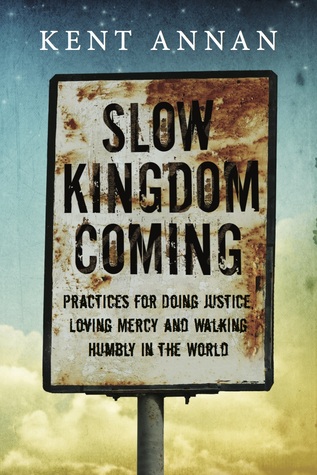VJN Recommends: Slow Kingdom Coming, Kent Annan

In the face of a world groaning for peace, advertisements bombard us with promises of quick-fixes and opportunities for “Insta-activism.” For many of us within the VJN community who have humbly sought to participate in God’s work of loving mercy and doing justice, we know the deep ache of holding onto His Kingdom promise that leans towards the “not yet” side of things. The work of justice that goes beyond Band-Aid, crisis care responses makes bigger demands. It demands we deliberate and discern longer, it demands that we try and fail more, it demands prayers that include lament. It demands that we trade in our worldly definitions of success for a Biblical view of faithful witness and waiting on the Lord.
VJN recommends Kent Annan’s book, Slow Kingdom Coming: Practices for Doing Justice, Loving Mercy and Walking Humbly in the World, as an essential for justice leaders. Annan offers a refreshingly honest, insightful, and hopeful approach to cultivate spiritual practices so that we can be Kingdom witnesses for the long haul. His wealth of experiences shape his Kingdom approach to the multi-faceted crises in the world—perhaps what is most refreshing is that Kent does not polarize the justice work of personal sin and relational brokeness from systemic sin and brokenness. Broken marriages, systemic racism, and predatory capitalism all cry out to be redeemed by the reconciling power of Jesus Christ. Slow Kingdom Coming reminds us how the posture of our souls and the rhythms of our days can empower or disempower us from engaging as fully present disciples. Continue to lean in or burn out? Annan found himself at that crossroad.
In the preface, Kent confesses:
Over the past twenty years I’ve personally and professionally succumbed to various failed justice shortcuts instead of living the freedom of faithful practices. I’ve been paralyzed by the complexity of trying to help others. I’ve huddled in bed during daylight because of sadness and discouragement. I’ve rushed to get good things done and so didn’t treat people as well as I should. I’m still confessing regularly my faults and my longing to better participate in justice—that God’s kingdom would come on earth as in heaven. I confess that I wish this weren’t such a slow kingdom coming.
But I’ve also seen people be incredibly generous with their time, talents and money in ways that inspire about humanity and are testimonies to God’s love. I’ve seen people in brutal circumstances make the best of new opportunities. I’ve seen hope stay tenaciously alive when by almost any measure it should be dead. I’ve seen ingenuity and humility in service of love.
All this has happened as I’ve been working for justice through education in Haiti for the past thirteen years. I’ve also been teaching and speaking around the United States and Canada. Before this I worked for a couple of years with refugees in Europe. I’ve been on short-term missions trips and have led some. I’ve had the photo of a sponsored child on my fridge. I’ve worked for and been a director of nonprofits. I’m a small donor and also a board member of a foundation that gives away millions of dollars each year.
Out of these experiences I’ve written this book about doing good without hiding from the bad—both around us and within us—because we’re called to be part of God’s kingdom coming. We’re invited to confess our vulnerabilities in serving justice so we can avoid dead-end shortcuts that damage others and ourselves. We’re invited to accept the grace and responsibility of living into our deepest longings for God’s kingdom. We’re invited to a responsible approach to helping other people flourish in our neighborhoods and in our world, where there is too much suffering. We’re invited to be part of deep, lasting change.
Phil Strout, the national director for Vineyard USA, shares about how the book has impacted his view of the Kingdom for our movement:
Here’s Kent Annan sharing more about what it means for the Kingdom to come slowly:
You can order the book and download study guide resources here.
